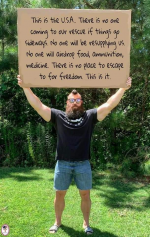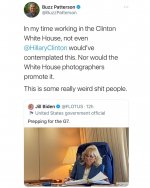-
In Memory of Rebarcock.
As we navigate life without Pat 'Rebarcock.' Flood, who passed on Sept 21, 2025, we continue to remember the profound impact he had on our community. His support was a cornerstone for our forum. We encourage you to visit the memorial thread to share your memories and condolences. In honor of Pat’s love for storytelling, please contribute to his ‘Rebarcock tells a story’ thread. Your stories will help keep his spirit alive among us.
You are using an out of date browser. It may not display this or other websites correctly.
You should upgrade or use an alternative browser.
You should upgrade or use an alternative browser.
Master Thread Dance Your Cares Away/Fraggle/Law Abiding Citizens
- Thread starter Bryan74b
- Start date
Master Threads
Good Night @MortgageHorn is Beat
Any of you in SEC country have any info on this apparent "suicide?"

New book reveals explosive details about Loretta Lynch-Bill Clinton tarmac meeting
Author of the book “Secret on the Tarmac” Christopher Sign said on Monday that his source saw it “all unfold” as he reveals new details about President Bill Clinton secretly meeting with former then-Attorney General Loretta Lynch regarding the Hillary Clinton email investigation.
Any of you in SEC country have any info on this apparent "suicide?"
DR. PETER MCCULLOUGH ON WITH REINER FUELMICH JUNE 11, 2021
Talk about vaccines = bioterrorism phase 2
Estimates 50,000 Americans dead from vaccines
Towards the end, the doctor says they've been tracking those who are attacking their message....says a French reporter wrote negative things (why would France have interest in what's happening in Texas?) and also a Singapore reporter, who apparently has ties to the Gates Foundation
Last edited:

Will Any Anti-Trump Story Hold Up?
No profession loves themselves like journalists love themselves. After all, they “write the fi

Brilliant Hero Dr: CDC Bureaucrats & Dem. Politicians Could be Guilty of Mass Murder & Crimes Against Humanity
I've known for well over a year now that we had an effective treatment for COVID-19. Hundreds of thousands of Americans could have been saved.

Why Is Apple Lowering Its Walled Garden for China but Not for the US?
Earlier this month, The New York Times reported on Apple’s dealings with China. In it, the Time

Why Kamala Won’t Go to the Border
Vice President Kamala Harris is in the ultimate no-win position when it comes to visiting the U.S./M

Chinese Defector Provides More Evidence Chinese Military is Behind COVID-19, Lab Leak
Last week, Matt reported on intel that our friends at RedState had, which pointed to information fro
Stumbled across this list of Pulitzer winners. What a joke. Here is the first one.
According to the Pulitzer Prize board, the New York Times won this award for its coverage of the coronavirus pandemic that exposed racial and economic inequities as well as failures of government in the U.S. and elsewhere. The Times was also recognized for the data provided "to help local governments, health care providers, businesses and individuals be better prepared and protected."
https://www.wesh.com/article/2021-pulitzer-prize-winners/36701081
According to the Pulitzer Prize board, the New York Times won this award for its coverage of the coronavirus pandemic that exposed racial and economic inequities as well as failures of government in the U.S. and elsewhere. The Times was also recognized for the data provided "to help local governments, health care providers, businesses and individuals be better prepared and protected."
Breaking news: Staff of the Star Tribune, Minneapolis
The Pulitzer board chose the newspaper staff for its "urgent, authoritative and nuanced coverage of the death of George Floyd at the hands of police in Minneapolis and of the reverberations that followed."
Investigative reporting: Boston Globe (Matt Rocheleau, Vernal Coleman, Laura Crimaldi, Evan Allen and Brendan McCarthy)
The Boston Globe won this award for its reporting "that uncovered a systematic failure by state governments to share information about dangerous truck drivers that could have kept them off the road, prompting immediate reforms," the Pulitzer board wrote.
Explanatory reporting: Reuters (Andrew Chung, Lawrence Hurley, Andrea Januta, Jaimi Dowdell and Jackie Botts) and Ed Yong of The Atlantic
The team at Reuters was recognized for its data examination of U.S. federal court cases involving "qualified immunity" shielding police who use excessive force, while Yong's pieces on the COVID-19 pandemic were recognized for breaking down challenges, highlighting failures and including relatable context.
Local reporting: Kathleen McGrory and Neil Bedi, Tampa Bay Times
The Pulitzer Prize board awarded these writers for "resourceful, creative reporting that exposed how a powerful and politically connected sheriff built a secretive intelligence operation that harassed residents and used grades and child welfare records to profile schoolchildren."
National reporting: Staffs of The Marshall Project; AL.com, Birmingham; IndyStar, Indianapolis; and the Invisible Institute, Chicago
All of these news outlets were recognized for their year-long investigative look at K-9 units and their damage to the public and police officers, which prompted reform.
International reporting: Megha Rajagopalan, Alison Killing and Christo Buschek of BuzzFeed News, New York
BuzzFeed was awarded this honor for a series of stories using satellite images, architectural insight and interviews with two dozen former prisoners "to identify a vast new infrastructure built by the Chinese government for the mass detention of Muslims," the Pulitzer board said.
Feature writing: Mitchell S. Jackson, freelance contributor to Runner’s World and Nadja Drost, freelance contributor to The California Sunday Magazine
Jackson was recognized for his account of Ahmaud Arbery's killing, which included reporting and personal experience about systemic racism in America. Drost's piece on a group's journey through Darién Gap, one of the most dangerous migrant routes in the world, also earned the award.
Commentary: Michael Paul Williams of the Richmond (Va.) Times-Dispatch
The Pulitzer Prize board chose Williams' columns "that guided Richmond, a former capital of the Confederacy, through the painful and complicated process of dismantling the city's monuments to white supremacy."
Criticism: Wesley Morris of The New York Times
Morris was recognized by what the board called "unrelentingly relevant and deeply engaged criticism on the intersection of race and culture in America."
Editorial writing: Robert Greene of the Los Angeles Times
Greene was recognized for his editorials on policing, bail reform, prisons and mental health that examined the Los Angeles criminal justice system.
Editorial cartooning: No award given
Breaking news photography: Associated Press
The board awarded the Associated Press for a collection of photographs from multiple U.S. cities that captured the country's response to the death of George Floyd.
Feature photography: Emilio Morenatti of the Associated Press
Morenatti was honored for a "poignant series of photographs that takes viewers into the lives of the elderly in Spain struggling during the COVID-19 pandemic."
Audio reporting: Lisa Hagen, Chris Haxel, Graham Smith and Robert Little of National Public Radio
The board chose the National Public Radio team for this award based on an investigative series about "no compromise" gun rights activists "that illuminated the profound differences and deepening schism between American conservatives."
This novel is about a community's efforts to halt stop the displacement and elimination of several Native American tribes in the 1950s.
Nonfiction: The Hot Wing King, by Katori Hall
A discussion of Black masculinity and how it is perceived, filtered through the experiences of a loving gay couple and their extended family as they prepare for a culinary competition.
History: Franchise: The Golden Arches in Black America, by Marcia Chatelain (Liveright/Norton)
A look at how the role the fast-food industry plays in African-American communities, which illustrates the relationship between fight for civil rights and the success of Black businesses.
Biography: The Dead Are Arising: The Life of Malcolm X, by the late Les Payne and Tamara Payne (Liveright/Norton)
A deeper look at the character, beliefs and forces that shaped the civil rights activist, based on dozens of interviews.
Poetry: Postcolonial Love Poem, by Natalie Diaz (Graywolf Press)
The collection of poems about being loved in an America troubled with conflict.
General nonfiction: Wilmington's Lie: The Murderous Coup of 1898 and the Rise of White Supremacy, by David Zucchino (Atlantic Monthly Press)
How the elected government of a Black-majority North Carolina city was overthrown.
Music: Stride, by Tania León (Peermusic Classical)
An orchestral journey that incorporates powerful brass and rhythmic motifs with Black music traditions from the U.S. and the Caribbean.
The Pulitzer Prize board recognized Frazier for "courageously recording the murder of George Floyd, a video that spurred protests against police brutality around the world, highlighting the crucial role of citizens in journalists' quest for truth and justice."
Journalism
Public service: The New York TimesAccording to the Pulitzer Prize board, the New York Times won this award for its coverage of the coronavirus pandemic that exposed racial and economic inequities as well as failures of government in the U.S. and elsewhere. The Times was also recognized for the data provided "to help local governments, health care providers, businesses and individuals be better prepared and protected."
https://www.wesh.com/article/2021-pulitzer-prize-winners/36701081
Journalism
Public service: The New York TimesAccording to the Pulitzer Prize board, the New York Times won this award for its coverage of the coronavirus pandemic that exposed racial and economic inequities as well as failures of government in the U.S. and elsewhere. The Times was also recognized for the data provided "to help local governments, health care providers, businesses and individuals be better prepared and protected."
Breaking news: Staff of the Star Tribune, Minneapolis
The Pulitzer board chose the newspaper staff for its "urgent, authoritative and nuanced coverage of the death of George Floyd at the hands of police in Minneapolis and of the reverberations that followed."
Investigative reporting: Boston Globe (Matt Rocheleau, Vernal Coleman, Laura Crimaldi, Evan Allen and Brendan McCarthy)
The Boston Globe won this award for its reporting "that uncovered a systematic failure by state governments to share information about dangerous truck drivers that could have kept them off the road, prompting immediate reforms," the Pulitzer board wrote.
Explanatory reporting: Reuters (Andrew Chung, Lawrence Hurley, Andrea Januta, Jaimi Dowdell and Jackie Botts) and Ed Yong of The Atlantic
The team at Reuters was recognized for its data examination of U.S. federal court cases involving "qualified immunity" shielding police who use excessive force, while Yong's pieces on the COVID-19 pandemic were recognized for breaking down challenges, highlighting failures and including relatable context.
Local reporting: Kathleen McGrory and Neil Bedi, Tampa Bay Times
The Pulitzer Prize board awarded these writers for "resourceful, creative reporting that exposed how a powerful and politically connected sheriff built a secretive intelligence operation that harassed residents and used grades and child welfare records to profile schoolchildren."
National reporting: Staffs of The Marshall Project; AL.com, Birmingham; IndyStar, Indianapolis; and the Invisible Institute, Chicago
All of these news outlets were recognized for their year-long investigative look at K-9 units and their damage to the public and police officers, which prompted reform.
International reporting: Megha Rajagopalan, Alison Killing and Christo Buschek of BuzzFeed News, New York
BuzzFeed was awarded this honor for a series of stories using satellite images, architectural insight and interviews with two dozen former prisoners "to identify a vast new infrastructure built by the Chinese government for the mass detention of Muslims," the Pulitzer board said.
Feature writing: Mitchell S. Jackson, freelance contributor to Runner’s World and Nadja Drost, freelance contributor to The California Sunday Magazine
Jackson was recognized for his account of Ahmaud Arbery's killing, which included reporting and personal experience about systemic racism in America. Drost's piece on a group's journey through Darién Gap, one of the most dangerous migrant routes in the world, also earned the award.
Commentary: Michael Paul Williams of the Richmond (Va.) Times-Dispatch
The Pulitzer Prize board chose Williams' columns "that guided Richmond, a former capital of the Confederacy, through the painful and complicated process of dismantling the city's monuments to white supremacy."
Criticism: Wesley Morris of The New York Times
Morris was recognized by what the board called "unrelentingly relevant and deeply engaged criticism on the intersection of race and culture in America."
Editorial writing: Robert Greene of the Los Angeles Times
Greene was recognized for his editorials on policing, bail reform, prisons and mental health that examined the Los Angeles criminal justice system.
Editorial cartooning: No award given
Breaking news photography: Associated Press
The board awarded the Associated Press for a collection of photographs from multiple U.S. cities that captured the country's response to the death of George Floyd.
Feature photography: Emilio Morenatti of the Associated Press
Morenatti was honored for a "poignant series of photographs that takes viewers into the lives of the elderly in Spain struggling during the COVID-19 pandemic."
Audio reporting: Lisa Hagen, Chris Haxel, Graham Smith and Robert Little of National Public Radio
The board chose the National Public Radio team for this award based on an investigative series about "no compromise" gun rights activists "that illuminated the profound differences and deepening schism between American conservatives."
Letters, drama and music
Fiction: The Night Watchman, by Louise Erdrich (Harper)This novel is about a community's efforts to halt stop the displacement and elimination of several Native American tribes in the 1950s.
Nonfiction: The Hot Wing King, by Katori Hall
A discussion of Black masculinity and how it is perceived, filtered through the experiences of a loving gay couple and their extended family as they prepare for a culinary competition.
History: Franchise: The Golden Arches in Black America, by Marcia Chatelain (Liveright/Norton)
A look at how the role the fast-food industry plays in African-American communities, which illustrates the relationship between fight for civil rights and the success of Black businesses.
Biography: The Dead Are Arising: The Life of Malcolm X, by the late Les Payne and Tamara Payne (Liveright/Norton)
A deeper look at the character, beliefs and forces that shaped the civil rights activist, based on dozens of interviews.
Poetry: Postcolonial Love Poem, by Natalie Diaz (Graywolf Press)
The collection of poems about being loved in an America troubled with conflict.
General nonfiction: Wilmington's Lie: The Murderous Coup of 1898 and the Rise of White Supremacy, by David Zucchino (Atlantic Monthly Press)
How the elected government of a Black-majority North Carolina city was overthrown.
Music: Stride, by Tania León (Peermusic Classical)
An orchestral journey that incorporates powerful brass and rhythmic motifs with Black music traditions from the U.S. and the Caribbean.
Special citations and awards
Darnella FrazierThe Pulitzer Prize board recognized Frazier for "courageously recording the murder of George Floyd, a video that spurred protests against police brutality around the world, highlighting the crucial role of citizens in journalists' quest for truth and justice."
My 13th is today. Lace anniversary. Got her a nice "lace" bracelet and a little something else for me! Congrats on 22.22nd wedding anniversary today. My wife is a BADASS!
Jus’ sayin’.
The GOP had several wake-up calls for the past decade or two. They refused to answer the phone.
All this confirms Hogg is a pussy being led around by other pussies.View attachment 26378
Actually thought this person was trolling hogg but alas they were not
Do Not give these shots to your children. Too many issues coming up.
Guess they realized people are finally waking up.
Happy Anniversary Brother!22nd wedding anniversary today. My wife is a BADASS!
Jus’ sayin’.
Happy anniversary!My 13th is today. Lace anniversary. Got her a nice "lace" bracelet and a little something else for me! Congrats on 22.

Biden opens European tour with slap at Brits
President Joe Biden is channeling his inner Clark Griswold on his trip to England for the G-7 summit. Too bad it’s his own nation he’s lampooning, writes Dominic Green of The Spectator.

No, ‘systemic racism’ is not why so many black kids are in foster care
Explaining her plan to improve foster care if elected mayor, Kathryn Garcia said she would begin with “rooting out systemic racism.” She’s hardly alone: It’s hard to throw a rock withou…
^^^ lots of inconvenient truth's in this article ^^^
Wow.
Killary List

 lasvegas.cbslocal.com
lasvegas.cbslocal.com
Killary List

CBS News | Breaking news, top stories & today's latest headlines
CBS News offers breaking news coverage of today's top headlines. Stay informed on the biggest new stories with our balanced, trustworthy reporting.
Any of you in SEC country have any info on this apparent "suicide?"
How many people do the clintons kill before someone puts a stop to it?
Biden doing a press conference right now. He was about to call on someone at random, then stopped himself and said out loud while looking down at his list of pre-picked reporters, “Uh, I’m sorry . . . I’m going to get in trouble with my staff if I don’t do this the right way . . . Jennifer Jacobs, Bloomberg.”
For
Fuck’s
Sake
For
Fuck’s
Sake
This thing is a fucking joke. He just said he wouldn't answer the question. Get him off my TV so I can watch Maria interview DeSantis.Biden doing a press conference right now. He was about to call on someone at random, then stopped himself and said out loud while looking down at his list of pre-picked reporters, “Uh, I’m sorry . . . I’m going to get in trouble with my staff if I don’t do this the right way . . . Jennifer Jacobs, Bloomberg.”
For
Fuck’s
Sake
Back at ya, Brother! Congrats!My 13th is today. Lace anniversary. Got her a nice "lace" bracelet and a little something else for me! Congrats on 22.
NCSWIC
Just creating a DNA strand over the G7. Nothing to see here.
It's a fairly common air show display. (It is harder than it looks to do well.) Nothing to do with DNA.
Similar threads
- Replies
- 13
- Views
- 582
- Replies
- 6
- Views
- 335
- Replies
- 0
- Views
- 2K
- Replies
- 56
- Views
- 5K





